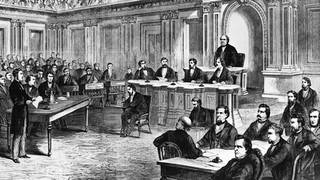"Andrew Johnson Was a Lot Like Trump": Echoes of 1868 in Trump's Impeachment Trial

After a nearly 13-hour marathon session, the U.S. Senate approved by a party-line vote the rules for the impeachment trial of President Trump. This marks just the third presidential impeachment trial in U.S. history. The Senate trial comes a month after the House impeached Trump for pressuring Ukraine to investigate his political rival Joe Biden. Under the rules, each side will be given 24 hours over a three-day period for opening arguments. Senators also agreed to automatically admit evidence from the House inquiry into the trial record. Republicans rejected 11 amendments from Democrats to subpoena witnesses and documents at this stage in the trial. Democrats were attempting to subpoena documents from the White House, the State Department and the Office of Management and Budget. Senate Minority Leader Chuck Schumer spoke early on Tuesday laying out the Democrats' case for impeachment. "President Trump is accused of coercing a foreign leader into interfering in our elections to benefit himself, and then doing everything in his power to cover it up," Schumer said. "If proved, the president's actions are crimes against democracy itself. It's hard to imagine a greater subversion of our democracy than for powers outside our borders to determine the elections from within." For more, we speak with Manisha Sinha, professor of American history at the University of Connecticut and author of "The Slave's Cause: A History of Abolition."